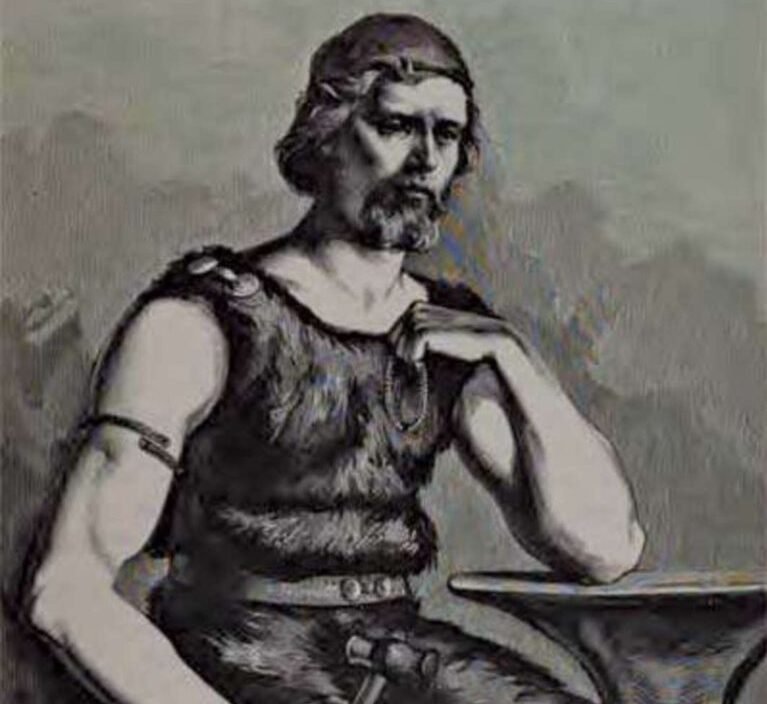Contents
ToggleIn short
Völund the Blacksmith God
Völund had two brothers, Egil and Slagfidur (or Slagfin). In one version of the myth, the three brothers discovered valkyries, swan princesses, bathing. To do this, the three valkyries, Œlrun, Alvit and Svanhvit, had taken off their swan clothes.
The three brothers hid these clothes, preventing the three princesses from escaping by flying away, and thus were able to marry them. A few years later, the three princesses found their swan costumes and disappeared. Völund's two brothers went looking for them, while he stayed behind.
In another version, Völund married the swan woman Hervör and had a son with her, Heime. Hervör left him a little later. In both versions, he found himself alone but kept a ring from his wedding. In the first myth, he forged seven hundred copies of this ring.
Subsequently, he was captured in his sleep by King Nidud of Sweden. To prevent him from escaping, Nidud had his leg tendons cut and imprisoned him on the island of Saeverstod. He forced him to forge pieces for himself and his family. Völund's ring was given to his daughter, Bodvild. Nidud took his sword.
To take revenge, Völund killed Nidud's two sons who had come to see him in secret. He made goblets from their skulls, which he gave to the king, jewelry from their eyes, which he gave to the queen, and a brooch from their teeth, which he gave to their daughter. When she came to see him in turn, he seduced her, made her pregnant, then fled using wings he had made for himself.
In German legend, it is said that he forged a sword for his son Heime, which was wielded by Miming and then by Hod. He is also said to be the Prince of the Dark Alves, of Svartalfheim.
It is also associated with the Wieland Forge, a burial tomb in the County of Oxford. This megalithic monument was so named by the Saxons, but it largely predates them. From this assimilation comes the superstition according to which a horse left overnight with a small piece of silver (groat) would be found the next day completely shod, the part having disappeared…
He is the Nordic ideal of the engineer.
The legendary goldsmith of the world Germanic is named Voļundr in Old Icelandic and Wēland in Western languages. This legend of germans of the East is indirectly attested to us by a passage from the Vita sancti Severini (Ve century). Extending to the Anglo-Saxon world, several English texts (Beowulf, Deor's complaint…) allude to it. But it is known to us mainly through Song of Völundr, which makes him a Lapland prince, and thereby Thidrek's Saga. The latter retains its name of Low German origin: Vēlent.
The first literary account of Wieland the blacksmith comes from England. It is an acephalous text copied in the Book from Exeter compiled around 950-1000. Due to the language used, scholars believe the poem was written between the VIe and the VIIe century. This anonymous text was given the name Deor's complaint Or Deor's complaint. It contains elements absent from Norse texts. The early diffusion of the Wieland legend in England is attested by the Auzon box set, undoubtedly made in Northumbria in VIIe century, which shows an episode from the legend of the blacksmith.
The legend seems to have spread at the time of the great invasions, notably with the Franks, the philological analysis showing an important Westic substrate. We thus note the importance of the diffusion of the name Wieland in romanized forms from the Carolingian era.
Social networks
Today, the Asatru celebrate Völund, the blacksmith god. His cult spread in the English islands then in the old continents during the Nordic invasions. This god was adopted by different cultures and integrated various myths and legends local. #mythology #myth #legend #calendar #25November #asatru #volund
Picture

